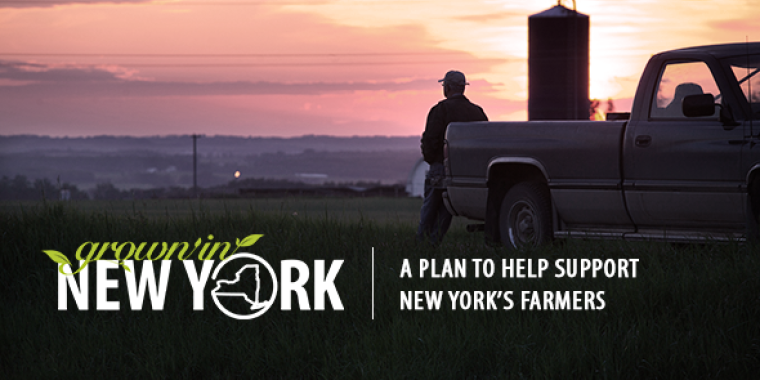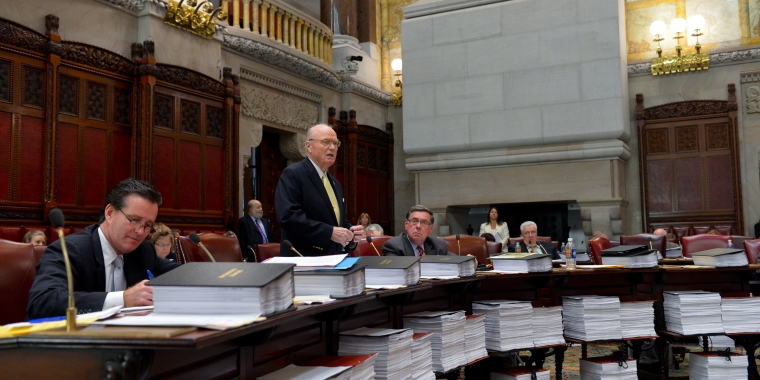
Sen. Farley Reports Continued Commitment to Support New York’s Farmers
Hugh T. Farley
March 4, 2015
-
ISSUE:
- Agriculture

State Senator Hugh T. Farley (R, C, I – Schenectady) and his fellow members of the Senate Republican Conference recently unveiled their new “Grown in New York” multi-part plan to help meet consumers’ demands for locally-grown food, support local farmers in their efforts to provide quality, fresh food, and strengthen rural communities.
New York is home to 36,000 family farms that contribute to the state’s more than $5.7 billion agriculture industry. Grown in New York expands upon the Senate Republican’s commitment to keeping New York’s farmers and agriculture industry thriving.
Over the past four years, the Senate Republican Conference has been a leader in reversing budget cuts and increasing funding for important agriculture and commodity-based research, marketing, and education programs, totaling $21 million. The Republican Conference also spearheaded the “Young Farmers New York” plan last year to support and encourage a new generation of farmers.
The 2015 Grown in New York plan includes:
Helping Farmers Expand Their Markets
> $1.75 million would be allocated to create up to five local transportation cooperatives where farmers can arrange to move their products to New York City and other major populated areas; and
> $250,000 in New York State Thruway Toll rebate aid would help lower the transportation cost of these goods.
Continuing to Fund Vital Agriculture Research, Marketing and Education Programs
> The Senate will propose $10 million in budget funding for agriculture programs; and
> An additional $10 million would support the long-overdue upgrades to Cornell’s world-leading Geneva Experiment Station, where applied research is solving problems ranging from plant disease to improved agriculture practices, increasing yields and ensuring farm success.
Expanding Young and New Farmer Initiatives
> $1 million would be allocated to the Beginning Farmer Innovation grants, and the arbitrary acreage cap that was previously required by this program would also be removed;
> To meet growing interest, there would be a $1 million increase to the Young Farmer Student Loan Forgiveness Program. This program would also be expanded to include agriculture educators as well as farm operators;
> $700,000 would be given to support school-based agriculture education, including Future Farmers of America and BOCES-based agricultural science education;
> $300,000 in matching grant funding for farmers would provide on-the-job training to aspiring farmers through the Cornell Cooperating Farm Apprenticeship;
>$1 million would aid in the creation of a Farm Bank, which would link new farmers with public and private land owners to create better opportunities for new farmers; and
> A $1 million revolving loan fund would be created to assist eligible beginning farmers finance land and buy basic farm equipment.
Creating a Grown in New York Brand
> $1 million in funding would create a Grown in New York marketing brand to help consumers identify NY-grown and farm-made products that contain at least 75 percent local ingredients.
Reaching Consumers of All Ages
> $1.8 million would expand the USDA’s Senior Farmers Market Nutrition Program to reach more senior consumers across the state.
Getting Produce From The Farm and Into Schools
>While the Executive Budget proposal only includes a $250,000 appropriation, the Senate’s proposal includes a $2.5 million financial incentive to encourage schools to choose locally produced, healthy food choices.
Expanding Cornell’s Harvest NY Program
> $1 million of funding would aid the statewide expansion of Cornell University’s successful Harvest NY program. It provides hands-on and commodities-based expertise to assist family farmers, with an emphasis on identifying new export opportunities and growing New York’s meat industry.
Focusing on Clean Energy
> $5 million in New York State Energy Research and Development Authority grants would direct additional clean energy resources to farm-based projects, including the installation of solar technology and construction of new digesters.
FarmNet Farm Business Transition Program
> $200,000 in funding would create a new Farm Business Transition Program, operated through Cornell’s FarmNet, to assist the smooth transfer of up to 75 farm businesses each year to new ownership.
Cornell NYOneStop Program
> $450,000 would create the first comprehensive program to help farmers navigate regulations and find information about programs and services that can grow their businesses.
The Grown in New York initiative will be included in the Senate’s one house budget resolution.
The full report is attached.
Share this Article or Press Release
Newsroom
Go to NewsroomHealth-Medicaid Joint Legislative Budget Hearing Slated for Feb. 3rd
February 3, 2014

Transportation Joint Legislative Budget Hearing
January 29, 2014
